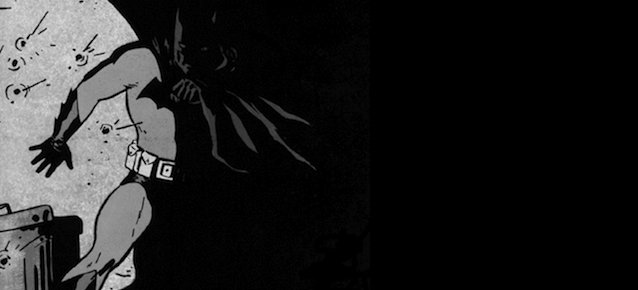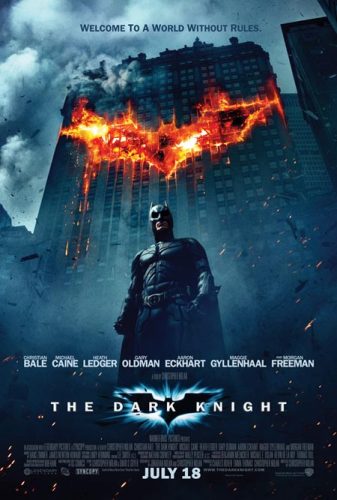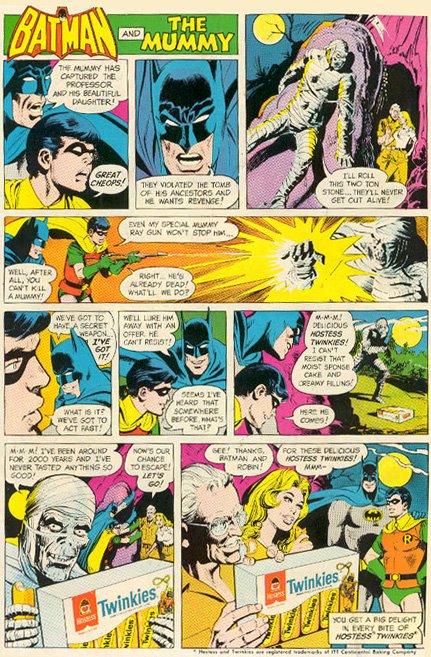
 The first reviews of The Dark Knight are in, and they’re really positive. As a long time fan, this makes me very excited. Batman Begins was a triumph, after all, and this one is supposed to top it.
The first reviews of The Dark Knight are in, and they’re really positive. As a long time fan, this makes me very excited. Batman Begins was a triumph, after all, and this one is supposed to top it.
In preparation I’ve been thinking about what makes Batman so compelling. What keeps us coming back? Is it simply that he’s the superhero who doesn’t have superpowers? The guy we can all relate to? That’s part of it but not all. After all, Spiderman is much more of an everyman, even considering his powers: he’s no billionaire, his private life’s a complete mess, he’s insecure about his career, etc.
No, the Batman mythos captivates us because it appeals to our fantasies of self-empowerment. It is a parable of Control and Justice, par excellence. Bruce Wayne is a man who, through sheer force of will (and a whole lot of dough), has harnessed the enormous pain of his childhood to achieve near God-like power over himself and his fellow citizens. He has become the judge, jury and hangman of Gotham City, a righter of wrongs who never compromises and always gets his man. And he does it all with incomparable style. Bat-a-rangs, anyone?
Yet Batman is clearly no Christ-figure. Unyielding and extremely violent, he is tortured by a past that never seems to pass (W. Faulkner). There’s loneliness and anger and lots and lots of darkness (and bats), all of which make him just human enough to be interesting. If Jesus speaks to our inner child, then Batman speaks to our own inner control freak.
Theologically speaking, Batman could be seen either as the ultimate affront to the First Commandment, or the final expression of works righteousness. That is, if there is no other authority/power out there besides our own – or if there is, and we are to be judged according to its standards – becoming Batman might be the most logical solution. And what is a vigilante if not someone who has taken the Law into their own hands?! Batman is a walking, talking Superego – “Just Do It” never had a better spokesman:
[youtube=http://www.youtube.com/watch?v=zCtxyCEa1RY&w=600]
I suppose you could say that Batman represents the Anti-Gospel in all its seductive glory. A fantasy, to be sure, but a thoroughly engrossing one, certainly worth counting the days until July 18th.
Six Great Batman Comics:
- Year One – Frank Miller & Dave Mazzucchelli. Miller only has a few tricks but uses them all here, to great effect. And Mazzucchelli’s artwork is just that – a work of art.
- The Long Halloween/Dark Victory – Jeph Loeb & Tim Sale. A thoroughly satisfying, epic tale that manages to incorporate the entire Rogue’s Gallery.
- The Dark Knight Returns – Frank Miller. A lot of folks think this story of Batman’s return from retirement in the Reagan-era is overrated, but I don’t agree. A great ending.
- Gothic – Grant Morrison & Klaus Janson. There are a number of great Batman horror stories, and this is my favorite.
- A Death In The Family/A Lonely Place Of Dying – Jim Starlin & Jim Aparo. A little silly in parts but still the ultimate Robin story line.
- Honorable Mention: The Killing Joke – Alan Moore & Brian Bolland. This one doesn’t really count, as it’s actually more of a Joker comic. Still, it’s definitely worth your time.
- Justice League Season 2/Justice League Unlimited Season 1. I’m not kidding. This Cartoon Network project from a few years ago “gets” Batman better than anything I’ve ever seen.
- Batman Begins. Some people might consider it sacrilege but I think Christian Bale is the best Bruce Wayne ever.
- Batman: The Animated Series. A ground-breaking show in every sense, it significantly outflanked the comics’ version of Batman for its entire run, not only presenting the definitive Dark Knight in a children’s time-slot, but also telling some of it’s heroes most original and compelling stories in any format.
- Batman Returns. Darker, artier and much campier than Burton’s first outing, I consider it the second best Batman movie. And Danny Devito is the Penguin!
- Batman TV Series (1966-68). It’s criminal that this is still unreleased on DVD.

COMMENTS
14 responses to “The Caped Control Freak: An Appreciation of Batman”
Leave a Reply














I like Batman because Ignatius J. Reilly likes Batman. That’s all I need.
I’m definitely looking forward to see this!
It seems from the review that the Joker, played by Heath Ledger, is Batman’s other side to the same coin. Both are deeply broken and emotionally disturbed. The Joker is the “rampaging id” as Travers says, while Batman is the same id harnessed to good use.
The question is, Will Christopher Nolan use this comparison to say something universal about the human condition, or will he speak to the power of choice to overcome the id?
I read somewhere that Heath Ledger modeled alot of the Joker’s mannerisms and expressions after John Lydon’s (aka Johnny Rotten of the Sex Pistols) stage antics.
That’s enough for me! I’m so there.
Anyone who likes Batman should check out his soul brother Moon Knight over at Marvel.
http://en.wikipedia.org/wiki/Moon_Knight
The graphic novel, “Silver Bullet” is the best Batman story ever. It is all about “what if” Clark Kent had landed in Gotham and was raised by the Wayne family. Basically it is Batman with all of the darkness and Superman power
first review (from rolling stone) here. gotta say, it got me excited, and it even mentions the film’s thematic emphasis on the human condition.
http://www.rollingstone.com/reviews/movie/16155928/review/21477208/the_dark_knight
What I like is the coming together of The Batman with The Mummy, and especially with (Hostess) Twinkies, which is evident in the remarkable page of that comic which has been displayed.
Don’t see how a person could ask for much more.
Dave, Batman Begins has a great line that fits with the works righteousness you mentioned:
“Why do we fall? So we can pick ourselves back up.”
I recite that to my daughter every night before bed.
Nice Alex.
I agree with your theological assessment of Batman, Dave. I’ve recently been thinking the same things about Batman. I think that is one of the reasons that he has always been my favorite comic book character — he appeals to my own sinful desires for vengeance and autonomy.
Anyway, good choices of top Batman comics. I’m glad to see that you put Year One at the top. I still remember the power of those 4 issues of Batman when they first came out in ’87.
Not having had much access to Marvel comics as a kid, I come to these sorts of discussions largely based on readings of the present material as a “new” movie/story (ie without much really knowledge of the traditions, comic book or otherwise, behind them) … so it is hard for me to address the “over-all” character of Batman
so, this is an interesting theological take on the matter of the bat to me.
I don’t necessarily think the Batman movies try to answer the justice question definitively in favor of free-will taking the law into one’s own hands, but I do think the character leans that way and that the movies ask the question as a hard, almost un-answerable, one.
the main question seems to me to be that of the outsider. what does one do when the strengths one has to help with are precisely those that label one anti-social etc? and for taking the law into one’s own hands … how far does the “rightful rule” of “law” extend? And in the case of violent reaction etc – does one turn the other cheek even when it is not one’s own cheek one is turning, but that of one’s family, one’s children, those within one’s line of sight who are too weak or small to defend themselves? does one simply console them that it is better to turn the other cheek … does one make the decision for them that that is what they should do? (“go, be warm and well fed …”) … does one spread one’s arms (or rather spread the arms of others for them) … or does one rather take up a whip of cords? Where does righteous anger/action end and vengeance begin? and is that one of those lines that can never be completely clarified in this life (purity of intention, whether good or evil, is a lot more difficult to attain in this life than any of us admit) and does waiting around for complete clarity make one allow some dreadful things to happen when one could have prevented them?
I think that is the thing I find most intriguing about the movies is those questions it raises.
As for psychological modeling … I like the characterization of Batman as both id and superego, and hence the internal struggle (at least I know they are always at war in me)
… as for opening night, I just got some mime face paint in the mail and am practicing applying it, have an old style vest and pants and button down long sleeved shirt, going to get some wing tips at a thrift store, and a black arm band for Ledger … should be fun
I’ve only just seen this, and I’m wondering if the conclusions here are right, especially regarding the incarnation of the character in Christopher Nolan’s films. In Batman Begins, Bruce Wayne’s natural inclination sis for revenge, and Rachel unmasks just how petty it is to be driven by such notions. Wayne’s encounter with Falconi seals the lesson, and leaves him a broken man. The tutoring of the league begins to renew his hope in finding some form of justice in a broken world, but he knows that an ‘eye for an eye’ approach based purely on fear and manipulation is merely a fall into another realm of horror – it is here the real ‘shadow’ of his father, understanding that genuine care/affection sustains us, even in fear and death, begins to arise in a renewed Bruce Wayne, and this, above all else, allows the open wound to become the persona for Batman – someone (in the Dark Knight), who will allow himself to become of no reputation for the love of true justice in a painfully broken and often insane world – THAT is what appeals to me most about this Batman mythos. It will be fascinating to see where this version concludes in the third and final chapter.